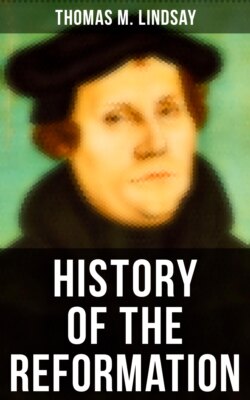Читать книгу History of the Reformation - Thomas M. Lindsay - Страница 29
На сайте Литреса книга снята с продажи.
§ 10. The “Epistolæ Obscurorum Virorum.”
ОглавлениеTable of Contents
While the controversy was raging (1514), Reuchlin had collected a series of testimonies to his scholarship, and had published them under the title of Letters from Eminent Men.44 This suggested to some young Humanist the idea of a collection of letters in which the obscurantists could be seen exposing themselves and their unutterable folly under the parodied title of Epistolæ Obscurorum Virorum. The book bears the same relation to the scholastic disputations of the later fifteenth century that Don Quixote does to the romances of mediæval chivalry. It is a farrago of questions on grammar, etymology, graduation precedence, life in a country parsonage, and scholastic casuistry. Magister Henricus Schaffsmulius writes from Rome that he went one Friday morning to breakfast in the Campo dei Fiori, ordered an egg, which on being opened contained a chicken. “Quick,” said his companion, “swallow it, or the landlord will charge the chicken in the bill.” He obeyed, forgetting that the day was Friday, on which no flesh could be eaten lawfully. In his perplexity he consulted one theologian, who told him to keep his mind at rest, for an embryo chicken within an egg was like the worms or maggots in fruit and cheese, which men can swallow without harm to their souls even in Lent. But another, equally learned, had informed him that maggots in cheese and worms in fruit were to be classed as fish, which everyone could eat lawfully on fast days, but that an embryo chicken was quite another thing—it was flesh. Would the learned Magister Ortuin, who knew everything, decide for him and relieve his burdened conscience? The writers send to their dear Magister Ortuin short Latin poems of which they are modestly proud. They confess that their verses do not scan; but that matters little. The writers of secular verse must be attentive to such things; but their poems, which relate the lives and deeds of the saints, do not need such refinements. The writers confess that at times their lives are not what they ought to be; but Solomon and Samson were not perfect; and they have too much Christian humility to wish to excel such honoured Christian saints. The letters contain a good deal of gossip about the wickedness of the poets (Humanists). These evil men have been speaking very disrespectfully about the Holy Coat at Trier (Treves); they have said that the Blessed Relics of the Three Kings at Köln are the bones of three Westphalian peasants. The correspondents exchange confidences about sermons they dislike. One preacher, who spoke with unseemly earnestness, had delivered a plain sermon without any learned syllogisms or intricate theological reasoning; he had spoken simply about Christ and His salvation, and the strange thing was that the people seemed to listen to him eagerly: such preaching ought to be forbidden. Allusions to Reuchlin and his trial are scattered all through the letters, and the writers reveal artlessly their hopes and fears about the result. It is possible, one laments, that the rascal may get off after all: the writer hears that worthy Inquisitor Hochstratten's money is almost exhausted, and that he has scarcely enough left for the necessary bribery at Rome; it is to be hoped that he will get a further supply. It is quite impossible to translate the epistles and retain the original flavour of the language—a mixture of ecclesiastical phrases, vernacular idioms and words, and the worst mediæval Latin. Of course, the letters contain much that is very objectionable: they attack the character of men, and even of women; but that was an ordinary feature of the Humanism of the times. They were undoubtedly successful in covering the opponents of Reuchlin with ridicule, more especially when some of the obscurantists failed to see the satire, and looked upon the letters as genuine accounts of the views they sympathised with. Some of the mendicant friars in England welcomed a book against Reuchlin, and a Dominican prior in Brabant bought several copies to send to his superiors.
The authorship of these famous letters is not thoroughly known; probably several Humanist pens were at work. It is generally admitted that they came from the Humanist circle at Erfurt, and that the man who planned the book and wrote most of the letters was John Jaeger of Dornheim (Crotus Rubeanus). They were long ascribed to Ulrich von Hutten; some of the letters may have come from his pen—one did certainly. These Epistolæ Obscurorum Virorum, when compared with the Encomium Moriæ of Erasmus, show how immeasurably inferior the ordinary German Humanist was to the scholar of the Low Countries.45
